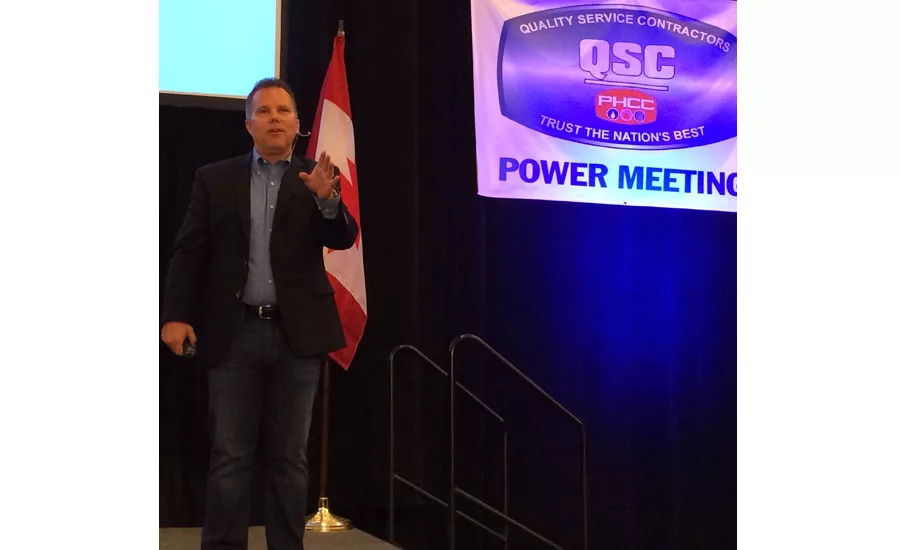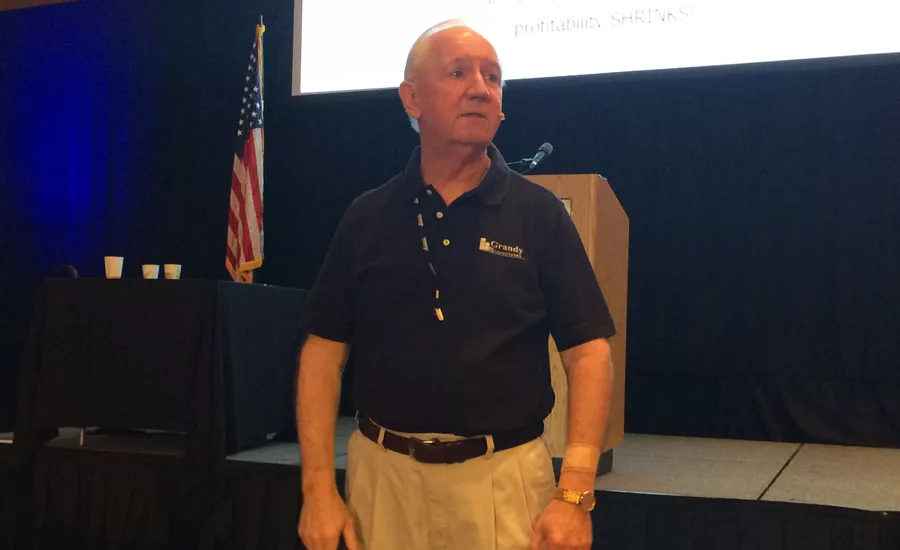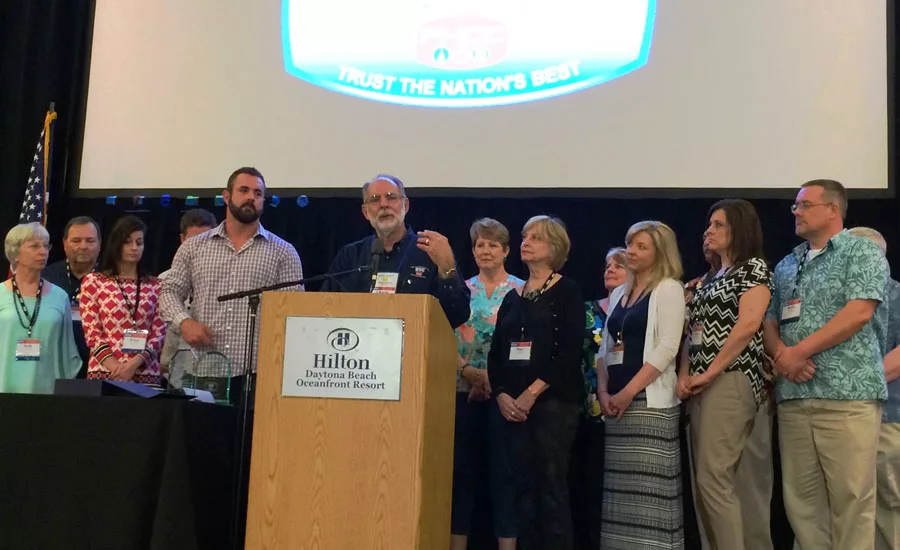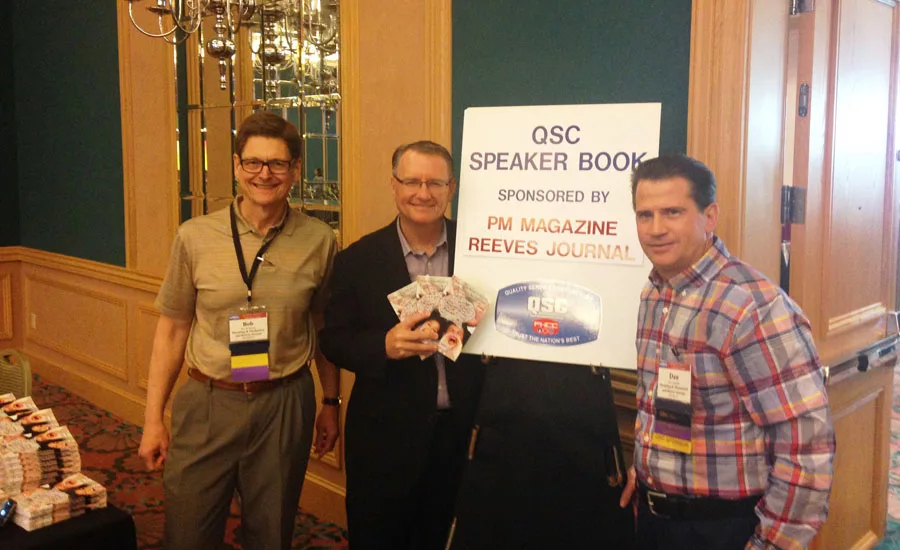Quality Service Contractors Power Meeting
QSC members get advice on how to achieve success.

PM columnist Kenny Chapman speaks at the QSC Power Meeting March 19 in Daytona Beach, Fla. Photo by Bob Miodonski/Plumbing & Mechanical

Business trainer Tom Grandy, who writes the Service Sense column for Reeves Journal, speaks March 18 at the Quality Service Contractors Power Meeting in Daytona Beach, Fla. Grandy & Associates is a charter member of QSC. Photo by Bob Miodonski/Plumbing & Mechanical

Members of Charlie Wallace's family join him on stage March 19 during the QSC Power Meeting in Daytona Beach, Fla. Photo by Bob Miodonski/Plumbing & Mechanical

Author Tom Morrison (center) stands with Bob Miodonski and Dan Ashenden of Plumbing & Mechanical and Reeves Journal March 18 during the QSC Power Meeting in Daytona Beach, Fla. Morrison spoke to QSC members on “How to Get People to Scream Your Name and Beg for More” based on his book, copies of which were sponsored by PM and RJ to be distributed to QSC members. Photo by Bob Miodonski/Plumbing & Mechanical
PM columnist Kenny Chapman, Reeves Journal columnist Tom Grandy and author Tom Morrison shared their advice on how to achieve business success March 18 and 19 during the Quality Service Contractors Power Meeting in Daytona Beach, Fla. Drawing 195 people, including 42 first-time attendees and 28 industry partners, the event was the largest QSC meeting in many years. It also marked the final meeting for Vice President and COO Charlie Wallace, who retired March 31 after leading QSC for 17 years.
Morrison, who wrote the book “How to Get People to Scream Your Name and Beg for More,” said a good attitude is the best way to get customers to scream your name.
“Avoid saying, ‘Yes, but,’ and make it ‘Yes, and,’ which shows a more positive attitude,” he said. “The second characteristic of success is the ability to adapt. We all know people who are unwilling to change. The third is perseverance and the fourth is communications. Learn how to network and connect with people.”
Networking becomes easier when using the F.O.R.M. method, Morrison said. You can converse with new acquaintances about: Family, Occupation, Recreation and (how I spend) My time.
Successful people make better choices about how they spend their time and money. They also surround themselves with people who help them to grow. Fear of the future and blaming others for what happens are among the elements that hold people back from success, he said.
“Never blame others,” Morrison said. “Become the CEO of your life to move forward.”
The importance of networking and a good attitude surfaced again during Grandy’s “15 Things All Successful Companies have in Common.”
Contractors should meet with other contractors and other trades to share ideas and solutions to problems, he said. Grandy also encouraged QSC members to make hiring people with good attitudes a part of their written business plan.
“Hire for attitude, train for service,” he said. “You can’t train attitude.”
Successful companies know what labor rate must be charged in each department; they develop a month-by-month, department-by-department cash flow budget and track results monthly. Other elements of success include: creating a marketing plan for the next 12 to 18 months; putting the majority of customers on an annual maintenance agreement program; instituting flat-rate pricing in the service department; sending a company print or electronic newsletter two to four times per year; organizing a continuing education program; making regular use of customer response cards; setting up a line of credit with a bank; and developing a formal and active customer service training program.
When creating a new business plan for your company, Chapman said, contractors should start with what they are doing well and then build on those successes. Contractors should meet with their entire team to make lists on what they should start — and stop — doing.
“How do these brainstorm lists become a business plan? Cull the lists, prioritize and set goals and timelines,” Chapman said. “Goals happen twice: Once when you set the goal in your mind and again upon accomplishing the goal. Revisit the lists quarterly and make sure you’re making progress on them. Ask yourself: Where am I today? Where do I want to go? How am I going to get there?
“Get three objectives done in the next quarter. That’s 36 objectives reached in a year.”
Just as important is following up with your team to share the plan and when actions will be taken. Regular follow-up sessions must be scheduled throughout the year, he said.
Chapman will be a featured speaker at the new Service World Expo industry event co-sponsored by Plumbing & Mechanical and Reeves Journal. The event will take place Oct. 26-27 in Las Vegas. For more information and to register, visit www.serviceworldexpo.com.
